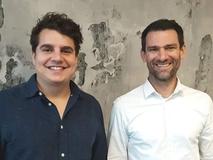Startups developing solutions to monitor asthma, advance the next-generation high-performance polymer 3D printing, support intelligent clinical decisions, and monitor breast cancer after initial treatment each win CHF 10,000
14.08.2020
Asthma Guardian, NematX, OncoGenomX, and Xemperia win Venture Kick's first stage of financial and entrepreneurial support. Their projects help patients monitor their asthma at night and prevent attacks, produce high-performance end-use parts with polymer 3D printing, make tailored and predictably effective breast cancer treatment a reality, and improve the survival rate of breast cancer patients by improving adjuvant therapies and follow-ups.
.jpg) |
 Asthma Guardian: Peter Tinschert and Iris Shih
|
 NematX: CEO Raphael Heeb and CTO Silvan Gantenbein
|
 OncoGenomX: CEO Wolfgang Hackl
|
 Xemperia: CSO Pr. Curzio Rüegg and CEO Marie Bertrand
|
Asthma Guardian: AI-based digital biomarkers for respiratory diseases
Most patients do not monitor their asthma—simply because today's methods are too inconvenient. Without monitoring, however, patients often respond too late to symptom deteriorations: Every year, Swiss health insurances pay CHF 38 million for preventable emergency treatment. Asthma Guardian's mission is to reduce emergency care for asthma patients by offering the world's most convenient asthma warning system. Peter Tinschert, Iris Shih, and Filipe Barata developed a solution for this problem during their doctoral studies at HSG and ETH Zurich. They use deep learning to leverage the smartphone's sensors to automatically monitor a patient's asthma at night. Through early warnings, Asthma Guardian gives patients a window of opportunity to increase their medication dosage in time, thereby preventing life-threatening and costly asthma attacks. The Venture Kick funding will be used to systematically explore customer needs and obtain regulatory counseling.
NematX: Next-generation high-performance polymer 3D printing
At present, more widespread adoption of 3D printing in high-tech markets is largely prevented by the limited selection of engineering materials and the fact that 3D printed parts show lower product performance compared to state-of-the-art manufacturing. Founded as a spin-off company from ETH Zurich in 2020 by CEO Raphael Heeb and CTO Silvan Gantenbein, NematX AG aims to introduce the next generation in high-performance polymer 3D printing. Their Nematic 3D Printing Technology makes liquid crystal polymers (LCPs) readily available for 3D printing to produce high-performance end-use parts that clearly outperform current benchmarks in polymer 3D printing. Target industries of NematX include aerospace and space, medical, and all industrial applications where parts are exposed to harsh environments. As a first mover in LCP additive manufacturing, and with high-performance polymers being poised to become the most profitable segment in polymer 3D printing, NematX assesses its medium-term market potential to CHF 300 million. They plan to allocate 60% of Venture Kick funds for further product development, 30% for business development activities, and 10% for marketing. NematX's goal is to acquire reference customers and industrial partners in all validated target markets within the next six months.
OncoGenomX: Smart Cancer Diagnostics (SCD)
Most patients do not monitor their asthma—simply because today's methods are too inconvenient. Without monitoring, however, patients often respond too late to symptom deteriorations: Every year, Swiss health insurances pay CHF 38 million for preventable emergency treatment. Asthma Guardian's mission is to reduce emergency care for asthma patients by offering the world's most convenient asthma warning system. Peter Tinschert, Iris Shih, and Filipe Barata developed a solution for this problem during their doctoral studies at HSG and ETH Zurich. They use deep learning to leverage the smartphone's sensors to automatically monitor a patient's asthma at night. Through early warnings, Asthma Guardian gives patients a window of opportunity to increase their medication dosage in time, thereby preventing life-threatening and costly asthma attacks. The Venture Kick funding will be used to systematically explore customer needs and obtain regulatory counseling.
NematX: Next-generation high-performance polymer 3D printing
At present, more widespread adoption of 3D printing in high-tech markets is largely prevented by the limited selection of engineering materials and the fact that 3D printed parts show lower product performance compared to state-of-the-art manufacturing. Founded as a spin-off company from ETH Zurich in 2020 by CEO Raphael Heeb and CTO Silvan Gantenbein, NematX AG aims to introduce the next generation in high-performance polymer 3D printing. Their Nematic 3D Printing Technology makes liquid crystal polymers (LCPs) readily available for 3D printing to produce high-performance end-use parts that clearly outperform current benchmarks in polymer 3D printing. Target industries of NematX include aerospace and space, medical, and all industrial applications where parts are exposed to harsh environments. As a first mover in LCP additive manufacturing, and with high-performance polymers being poised to become the most profitable segment in polymer 3D printing, NematX assesses its medium-term market potential to CHF 300 million. They plan to allocate 60% of Venture Kick funds for further product development, 30% for business development activities, and 10% for marketing. NematX's goal is to acquire reference customers and industrial partners in all validated target markets within the next six months.
OncoGenomX: Smart Cancer Diagnostics (SCD)
Half of all breast cancer patients (370,000/year in the US and the EU) receive sub-optimal treatment, and the availability of 20 clinical decision-support tools has not changed this. This considerable unmet need lies in the absence of methods to identify the “right” drugs that will allow permanent disease control and improved life expectancy. OncoGenomX, founded by CEO Wolfgang Hackl and co-founded by David Demanse, fills this gap. Their solution, Smart Cancer Diagnostics (SCD), is powered by four innovative technologies: a gene assay to determine the biologic properties of a cancer; an AI software to match effective cancer drugs to a particular cancer; MammaLogX, a continuously learning base of clinical intelligence; and a machine learning software to generate clinical intelligence.
The benefits of SCD are the prediction of clinical and biologic tumor behavior, and treatment vulnerability and outcome realistically (prediction accuracy: 90%) and with unprecedented reliably (error rate: 10%). SCD will target the global breast cancer diagnostics market. The market size is estimated at EUR 4.3 billion in 2019, expected to reach EUR 7.1 billion in 2025, growing at a CAGR of 7.7%. OncoGenomX plans to use the Venture Kicks funds for a PPA submission, a test synthesis of the final gene probe kit, and the development of a clickable prototype of MammaLogX by next December.
Xemperia: A blood-based test to monitor breast cancer after initial treatment
The benefits of SCD are the prediction of clinical and biologic tumor behavior, and treatment vulnerability and outcome realistically (prediction accuracy: 90%) and with unprecedented reliably (error rate: 10%). SCD will target the global breast cancer diagnostics market. The market size is estimated at EUR 4.3 billion in 2019, expected to reach EUR 7.1 billion in 2025, growing at a CAGR of 7.7%. OncoGenomX plans to use the Venture Kicks funds for a PPA submission, a test synthesis of the final gene probe kit, and the development of a clickable prototype of MammaLogX by next December.
Xemperia: A blood-based test to monitor breast cancer after initial treatment
New cancer therapies have provided significant survival benefits in breast cancer. Nevertheless, relapses occur in about a quarter of patients, and breast cancer remains the first cause of cancer-related death for women. In order to improve survival, it is crucial to prevent relapses by improving adjuvant therapies and follow-up. To date, there is no specific monitoring test to assess whether breast cancer is cured, dormant, or progressing after the initial treatment. Xemperia—soon to-be-founded by Pr. Curzio Rüegg, a professor from UNIFR and CSO; Marie Bertrand, CEO; and Frederic Fer, CTO—will bring an innovative blood-based test for breast cancer monitoring and early detection of relapses to the market. The clinical implications for such tests are potentially huge: The tests could change the way women are monitored, following adjuvant therapy, and are allowing the rapid therapy adaptation in the event of resistance of progressing cancer before becoming symptomatic. With 1.7 million new cases of breast cancer each year, the global breast cancer diagnostics market was worth more than US$ 4.6 billion in 2018 and is anticipated to expand at a 7.7% CAGR over the 2019-2026 period.


